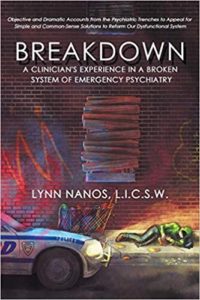
I had a very personal interest in reading Breakdown, by Lynn Nanos, L.I.C.S.W., because I have a family member with schizophrenia. Along with many others, I have felt intensely frustrated with every aspect of the mental health care system, including hospitals and their staff. I needed to find out what she had to report from her own professional experiences as a mobile emergency psychiatric clinician, with the special skills and ability to orchestrate involuntary hospital admissions.
The book is well written, heart-wrenching in many of the real patient stories. I could well imagine the author going home each night, still worrying about the safety and continuum of care (or lack of it) for those she evaluated each day. And in the current times we live in, with such a severe shortage of hospital beds in psychiatric wings, I was shocked to learn from her research that about 12% of those admitted for emergency psychiatric care are what the mental healthcare industry calls “malingerers.”
These are folks who don’t fit the criteria for gravely ill when they are evaluated, but they work the system so they can gain admission and have a nice all-expenses paid mini-vacation in a hospital. This is also at the expense of so many desperate people who really do need the care, but there are no beds available for them. My own family member once spent five days in the E.R. at USC Medical Center, waiting for placement and continuing to deteriorate each passing day.
Even more frustrating was the author’s confirmation from her own documentation, the frequency with which the hospitals discharge psychiatric patients before they are stable. This is just one of many ways in which the broken mental healthcare system actually encourages relapse and sabotages recovery for the most seriously mentally ill.
On the up side, it was very comforting to know that there are such dedicated professionals like Ms. Nanos, working on behalf of those with little-to-no capacity to help themselves. An underlying theme in Breakdown also addresses the touchy issue of involuntary treatment. We live in a nation where many people maintain the myopic view point that a person has the right to be as psychotic as they want to be (until they harm someone.) Both inside and outside the mental healthcare industry, there are very powerful and vocal opponents of involuntary treatment because they claim that a person’s rights would be violated.
The case studies and research done for Breakdown make it very clear that we need to intervene for those who don’t have the capacity to make rational, safe choices for themselves. A temporary suspension of personal “freedoms” may just save a life, or many lives, and actually provide enough treatment for a person to gain some insight and eventually experience a higher quality of life.
A copy of Nanos’ book should be read by every mental health policy maker in the country. I recommend Breakdown to anyone who wants to understand more of the process and circumstances under which a seriously mentally ill person gets hospitalized, including those who are homeless or without family members to help them.
Kartar Diamond is author of Noah’s Schizophrenia: A Mother’s Search for Truth, to be published on 9/22/20.



Leave A Comment
You must be logged in to post a comment.